
Image:UNESCO
Welcome to my website
I am an historian based at the University of Geneva, Switzerland. My research explores the history of Europe and colonial Africa in a transnational, transimperial and global perspective, with a focus on education, childhood and science.
I studied at the University of Geneva, the Ecole Normale Supérieure (as pensionnaire étranger) and the Ecole des hautes études en sciences sociales in Paris. After receiving my PhD in history from the University of Geneva and the EHESS, I have held visiting positions in the Universities of Heidelberg, Paris 1, Sciences Po Paris and Oxford. Between 2016 and 2019, I was a SNF Ambizione Fellow at the Institute of Political Studies of the University of Lausanne, as well as the co-Director of the Centre of International History and Political Studies of Globalization (2017-2019). In 2015-2016 and 2019-2021, I was a Research and Teaching Fellow at the Department of History of the University of Geneva. Since 2021, I am a Senior Research Associate at the Archives Institut Jean Jacques Rousseau, a research unit of the University of Geneva. I am also the co-editor-in-chief of Histoire de l’éducation and a member of the editorial boards of the International Review of Sociology and Historical Studies in Education.
I have extensively published on the history of education in Europe and colonial Africa, looking particularly at how processes of internationalization intersected national and local reforms of educational systems in the 19th and 20th century. My first book – L’école républicaine et l’étranger (2015) – explores the wide range of transnational circulations and exchanges that shaped French school reforms in the second half of the 19th century. This research has been awarded the Louis Cros Prize in 2013 and the ISCHE First Book Award in 2017. My second monograph, entitled Internationaliser l’éducation. La France, l’Unesco et la fin des empires coloniaux en Afrique (1945-1961), has been published in March 2023. It focuses on colonial education in Africa and provides a connected history of imperial and international development policies at the end of empire.
Recentely, I have also worked on the history of scientific cooperation in Europe and colonial Africa (1920s-1960s). Drawing on a social history approach focused on the study of individual trajectories of scholars and experts, I investigate how inter-imperial institutions – such as the Scientific Council for Africa and the Commission for Technical Cooperation in Africa South of the Sahara – shaped new research practices and discourses in an age of imperial crisis, especially in the fields of education, human/natural sciences and locust control.
My ongoing project connects global history to the history of education and science. I am currently leading a SNSF project (2023-2027) that explores the production and circulation of the « sciences of the child » between Switzerland and countries of the Global South (Brazil, Cameroon, Turkey, Vietnam). The aim is to shed light, on the one hand, on the civilising and racial views of Swiss actors and institutions, how these views influenced scientific research and educational initiatives, and how they intersected with anticolonial and antiracist political activism. On the other hand, the project will assess how actors from the Global South co-produced specific knowledge on childhood and education . By examining the social, intellectual and political logics underlying the production and circulation of knowledge about childhood on a global scale, this research allows for a rethinkink of North-South relations and offers a new, fresh look on the « century of the child » (more information here).
Get in touch: damianomatasci@gmail.com
NEWS
NEW BOOK (OPEN ACCESS)
« Genève (post)coloniale ». Les ambivalences d’une ville suisse et interntionale (Georg, 2025)
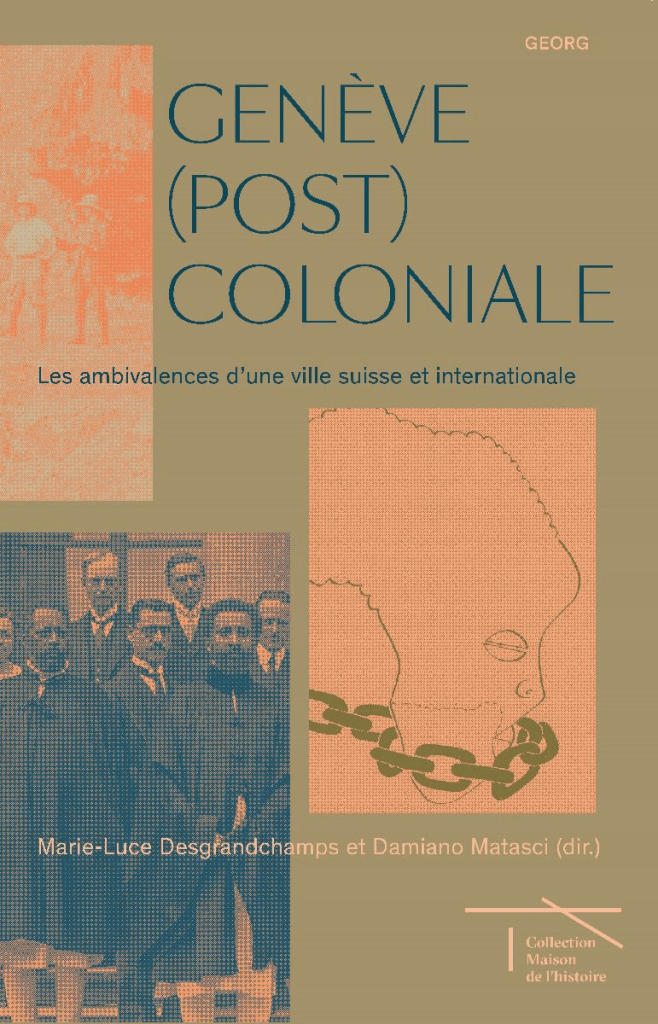
Comment appréhender le rôle joué par Genève et les Genevois·es dans le monde colonial ? Quels héritages témoignent de cette implication ? À une époque où la présence du passé colonial dans l’espace public est controversée, l’ouvrage apporte des réponses à ces questions. Il montre comment cette ville suisse et internationale s’est inscrite dans les réseaux transimpériaux européens, tout en servant de plateforme à l’anticolonialisme. Genève se trouve également au coeur des enjeux politiques et diplomatiques posés par les décolonisations, qui reconfigurent les relations Nord-Sud. Fondées sur des sources inédites, les contributions rassemblées ici dévoilent la complexité et les ambivalences d’une telle histoire. En proposant de nouvelles perspectives sur les réalités de la Suisse coloniale et postcoloniale, elles fournissent des clés de lecture pour saisir un sujet sensible qui suscite depuis plusieurs années un véritable débat de société.
Avec les textes d’Andreas Würgler, Léa Boldo, Bernard C. Schär, Naïma Maggetti, Pedro Cerdeira, Estelle Sohier, Fabio Rossinelli, Irène Herrmann, Thierry Maurice, Camille Jaccard, Odile Moreau, Emmanuelle Sibeud, Guillaume Linte, Floriane Morin, Caroline Montebello, Cécile Boss et Joëlle Droux, Rita Hofstetter, Bernard Schneuwly, Marie-Luce Desgrandchamps, Damiano Matasci, Marisa Fois, Aline Martello, Sarah Scholl, Pamela Ohene-Nyako.
SPECIAL ISSUE
This special issue of Histoire de l’éducation offers international and transnational perspectives on the history of European contemporary education. Articles are available here.
H-DIPLO ROUNDTABLE
An inspiring conversation on my book Internationaliser l’éducation with Harry Gamble, Pierre Guidi, Jessica Lynne Pearson, Elisa Prosperetti and Angela Villani.
NEW BOOK
Educational Internationalism in the Cold War. Plural Visions, Global Experiences
Routledge, 2025. Co-editor with Raphaëlle Ruppen Coutaz
The book is available in open access
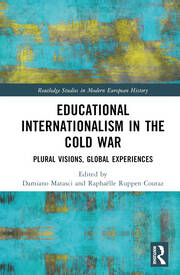
CONFERENCES IN BRASIL – APRIL 2025
Two DEGESUD international conferences co-organised with José Gondra, University of Rio de Janeiro, and Wagner Walente Rodrigues, University of Sao Paolo. More information about the project here.
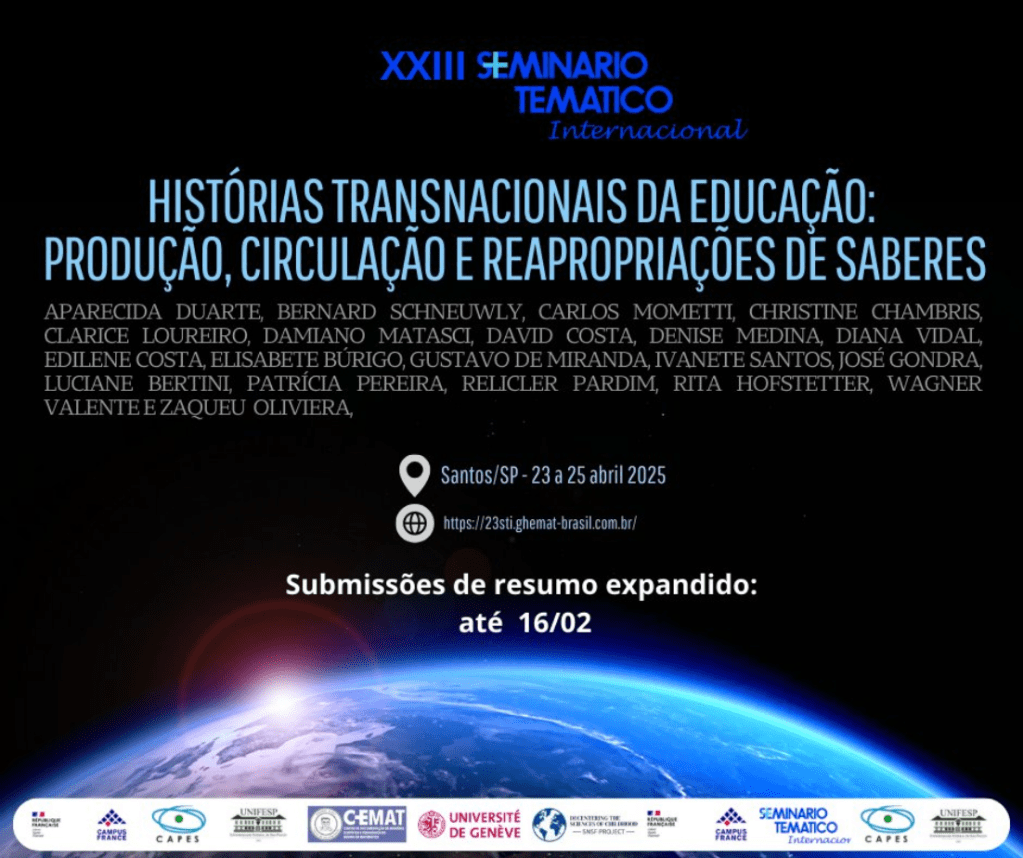
INTERNATIONAL WEBINAR SERIES
UNESCO’s Role in Post-War Educational Transformation and Decolonization
The international webinar series UNESCO’s Role in Post-War Educational Transformation and Decolonization is being organized by the Roma Tre University, University of Coimbra, and University of Geneva. The series will be held on march 26, april 14, and april 16, 2025, at 4:00 pm Rome Time (CET). Each session will feature two parallel panels, inviting participants to actively engage in critical dialogues concerning the multifaceted legacies of decolonization and the complex challenges posed by globalization, with a keen focus on fostering innovative approaches to knowledge production and cultural exchange.
The final event will take plance in Rome on November 18, 2025.
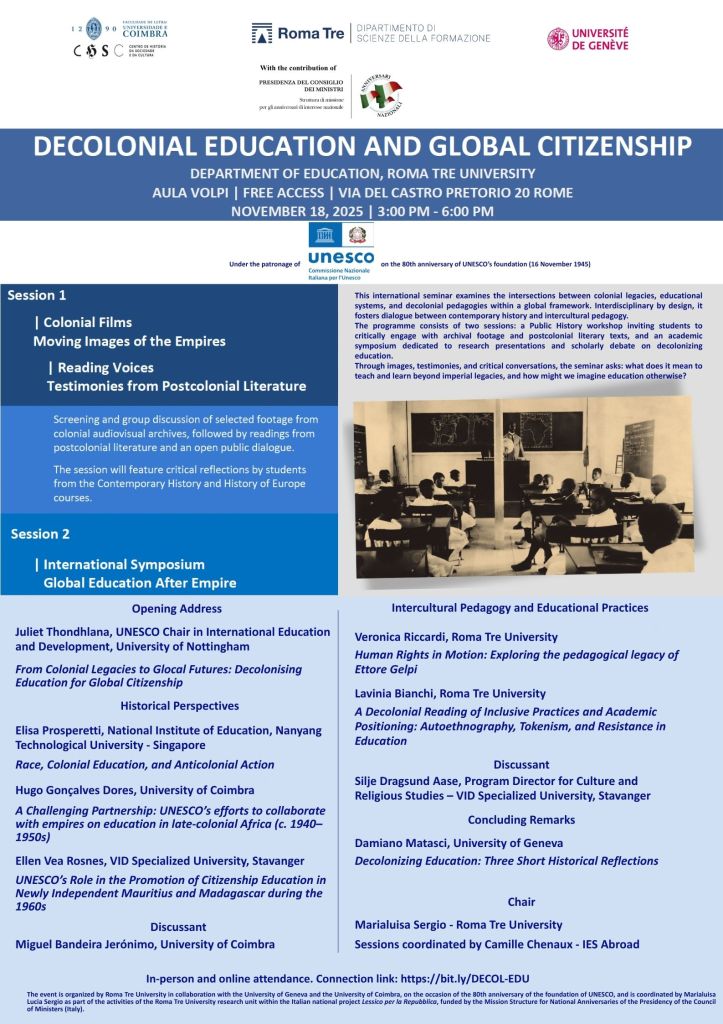
CALL FOR PAPERS
Call for papers for an international webinar series on
UNESCO’s Role in Post-War Educational Transformation and Decolonization. On the 80th Anniversary of UNESCO’s Founding
Deadline: November 20, 2024
CONFERENCE: Connected Histories of Decolonization, Third Worldism, and Radical Activism
A conference co-organized with Andrea Brazzoduro (Naples). Take a look at the programme.
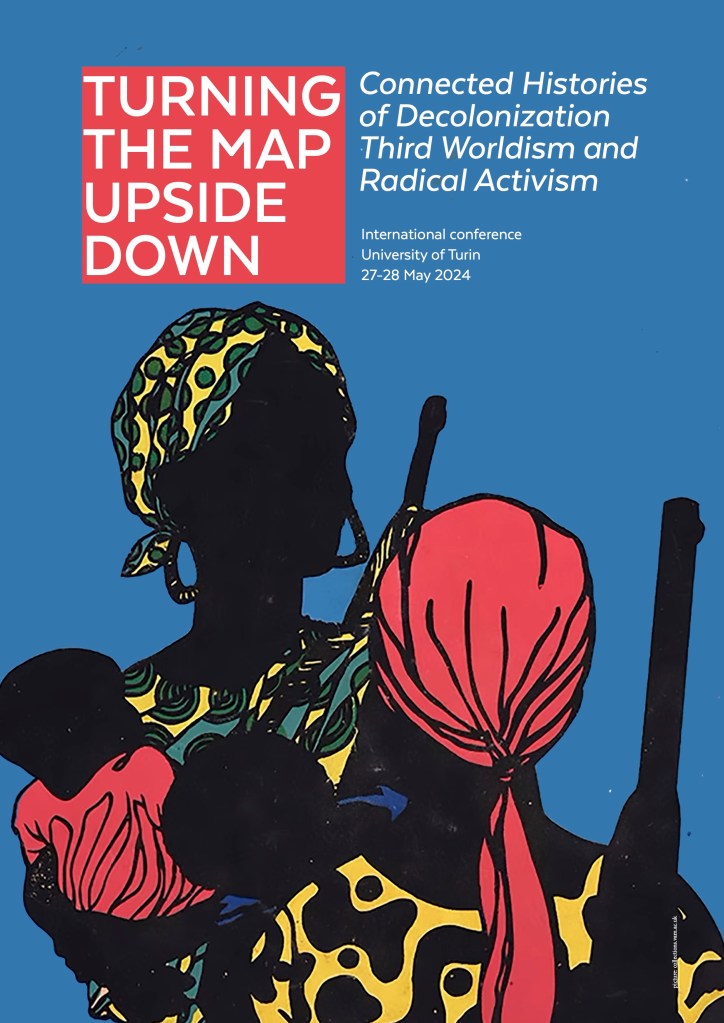
BOOK: Internationalizing Colonial Education
My new monograph is out!
Internationaliser l’éducation. La France, l’UNESCO et la fin des empires coloniaux en Afrique (1945-1961), Presses universitaires du Septentrion, 2023
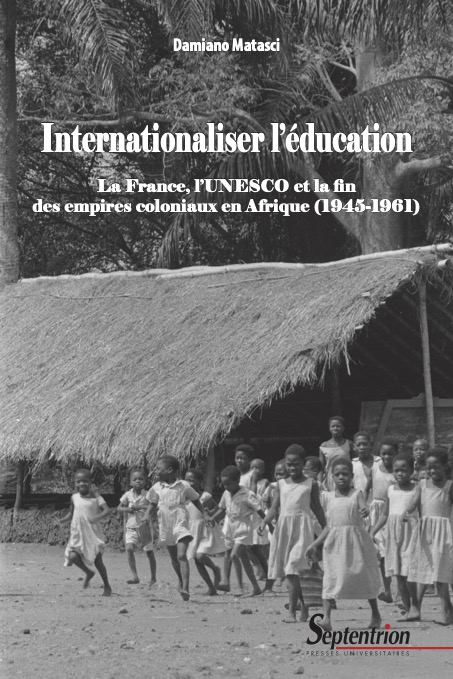
Pourquoi l’accès au savoir a-t-il constitué l’un des grands enjeux de la décolonisation? C’est la question à laquelle cet ouvrage se propose de répondre en examinant le processus d’internationalisation de la politique éducative française en Afrique subsaharienne entre 1945 et 1961. Fondée sur une riche documentation archivistique, cette enquête met en lumière les relations qui se tissent entre la France, les autres puissances coloniales européennes et l’UNESCO, offrant une plongée unique au cœur des visions contrastées du développement et de la coopération internationale qui émergent au sortir de la Seconde Guerre mondiale. Le livre retrace plus particulièrement les échanges et les rivalités qui accompagnent l’élaboration de nouveaux paradigmes – en particulier l’éducation de base – et analyse de manière détaillée leur mise en application en Afrique occidentale et équatoriale française. Il dévoile enfin les multiples reconfigurations qui s’opèrent au moment des indépendances, fournissant un éclairage inédit sur la genèse de l’aide au développement.
WORKSHOPS: Global Histories of Education, Childhood and Youth
The SNF project « Decentering the Sciences of Childhood. International Geneva and the Global South (1919-1980) » – DEGESOUTH – has officially started!
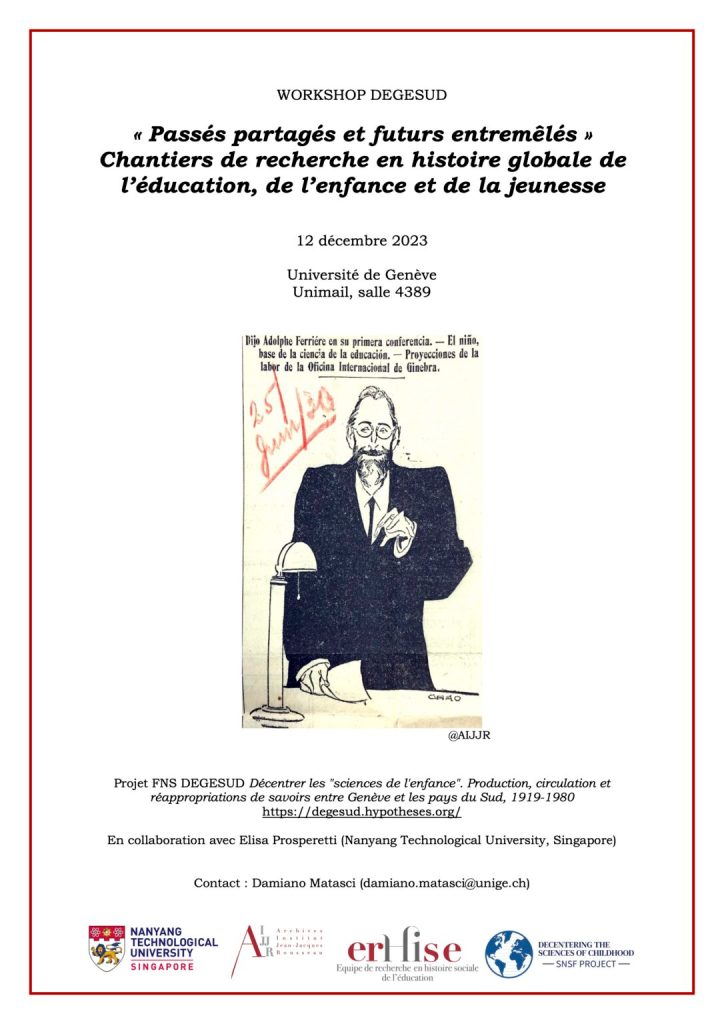
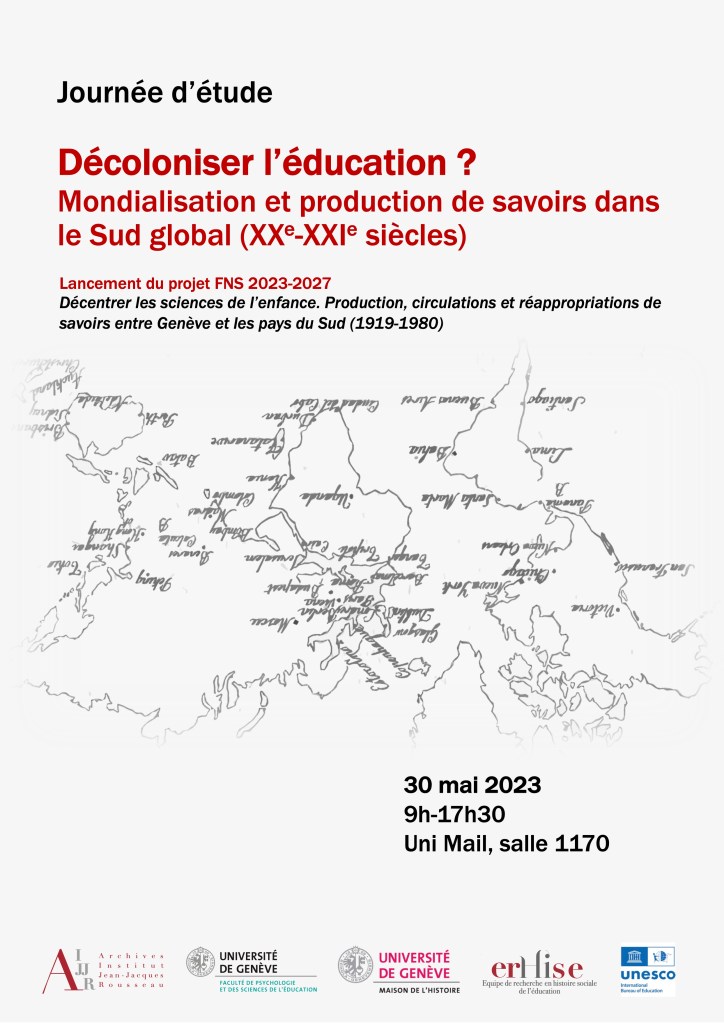
CALL FOR PAPERS: Exploring Geneva (post)colonial Past
CALL FOR PAPERS
La « Genève (post)coloniale » : sources, histoires, mémoires
Journées d’étude, 9-10 novembre 2023, Université de Genève
Au cours de ces dernières années, la présence dans l’espace public genevois d’un passé lié à l’esclavage et au colonialisme a été régulièrement au cœur de l’actualité. La gestion de cet héritage, visible dans les monuments ainsi que dans es noms de rues et d’édifices, a fait l’objet de nombreuses discussions, qui ont impliqué des acteur.trices étatiques, académiques, culturel.les et de la société civile. Des mesures concrètes ont aussi été prises, non sans polémiques, à l’image de la récente décision de rebaptiser le bâtiment de l’Université de Genève «Carl Vogt», entérinée en 2022 après les travaux d’un groupe de réflexion pluridisciplinaire.
S’il se décline localement, ce débat s’inscrit dans un contexte national et international qui a vu une série d’initiatives se produire en dehors et au sein des universités. Tout d’abord, la remise en cause du passé colonial et esclavagiste et de sa visibilité dans les lieux publics a nourri de nombreuses mobilisations citoyennes et institutionnelles, ainsi qu’en témoignent la campagne #RhodesMustFall en Afrique du Sud en 2015, les « déboulonnages » de statues aux États-Unis, en Belgique et en Grande-Bretagne, ou encore certaines interventions directes sur l’espace urbain, comme à Neuchâtel en 2018 et à Berne en 2022. Ensuite, une réflexion critique s’est engagée autour des conditions de production et de transmission des savoirs tant dans le Nord que dans le Sud du monde, impliquant les universités, les musées et, dans une moindre mesure, les centres d’archives et les bibliothèques. Enfin, sur le plan historiographique, la recherche académique a accordé une attention croissante aux dimensions paneuropéennes et transimpériales de l’entreprise coloniale, soulignant notamment les imbrications de la Suisse, mais également celles d’autres régions (Pologne, pays scandinaves), avec l’esclavagisme et le colonialisme. Comme l’atteste désormais une abondante littérature, cette forme de « colonialisme sans colonies » a été portée par des acteur.trices nombreux.ses et divers.es, et s’est manifestée dans des champs aussi variés que le commerce, la religion, la science, la culture, la littérature, les arts ou encore la sphère militaire.
Afin de mieux appréhender ces différents enjeux et les défis que ce passé pose encore de nos jours, ces journées d’étude ont pour objectif de retracer le vaste éventail de relations que Genève a entretenu avec l’esclavage et le colonialisme durant les époques moderne et contemporaine. Ces liens ont été multiples et ont fait l’objet de recherches approfondies, qu’il est temps de rassembler, de comparer et de mettre en perspective avec d’autres contextes, en Suisse (Fribourg, Neuchâtel, Zürich et Berne notamment) et à l’étranger. La spécificité de ces journées est d’étudier la « Genève (post)coloniale » à partir d’une approche résolument historienne et empirique, fondée sur des enquêtes documentaires et archivistiques fouillées capables de restituer la grande complexité et, parfois, les paradoxes qui ont marqué ces connexions. Il s’agit d’explorer cette histoire dans toutes ses dimensions, ses contradictions et, bien sûr, ses asymétries. Dans le sillage des nouvelles réflexions historiographiques sur la projection de l’Europe à l’échelle globale, il sera également question d’examiner comment Genève s’est elle-même transformée au contact du monde colonial et postcolonial. Aussi, convient-il d’étudier les différentes manières dont des acteur.trices issu.es des pays du Sud – réseaux anticolonialistes, tiersmondistes, féministes et antiracistes, mais aussi étudiant.es, savant.es, cadres, diplomates, etc. – se sont approprié.es les ressources offertes par une « ville internationale », en particulier dans le contexte des décolonisations. Au final, donc, la rencontre entend proposer un regard inédit sur Genève et la Suisse dans l’histoire de la mondialisation, tout en faisant rayonner cette réflexion dans la cité. La manifestation est ouverte au public et toute personne intéressée est invitée à envoyer une proposition de communication. Les thèmes listés ci-dessous fournissent une première indication des axes de recherche possibles :
- Acteur.trices genevois.es (individus, organisations, etc.) ayant été directement ou indirectement impliqué.es dans le commerce des esclaves et l’entreprise coloniale.
- Imaginaires et représentations coloniaux et édification de théories racistes à Genève (littérature, science, expositions, arts, manuels scolaires, etc.).
- Trajectoires d’individus issus des empires ayant séjourné à Genève (étudiant.e,s, savant.e.s, diplomates, etc.).
- La « Genève internationale » et le monde (post)colonial : organisations internationales, ONG, instituts universitaires; rôle et activités des réseaux anticolonialistes, tiersmondistes, féministes et antiracistes.
- Enjeux mémoriels et gestion de l’espace public (monuments, noms de rues et de bâtiments) ; politiques contemporaines de « décolonisation » des savoirs, de la recherche académique ainsi que des collections muséales et documentaires (archives, bibliothèques).
Marie-Luce Desgrandchamps (Marie-Luce.Desgrandchamps@unige.ch), Taline Garibian (Taline.Garibian@unige.ch), Naïma Maggetti (Naima.Maggetti@unige.ch), Damiano Matasci (Damiano.Matasci@unige.ch)
Les propositions de communication (200-300 mots) sont à envoyer par email aux organisateur.trices avant le 15 mai 2023.
ARTICLE: The History of Locust Control in Colonial Africa
« Gouverner la nature, moderniser le colonialisme. Hans J. Brédo, la recherche antiacridienne et la coopération interimpériale en Afrique (années 1930-années 1950) », Histoire@Politique.Politique, culture, société, no 48, 2023.
The article is available in open access
SPECIAL ISSUE: Transimperial Histories of Africa
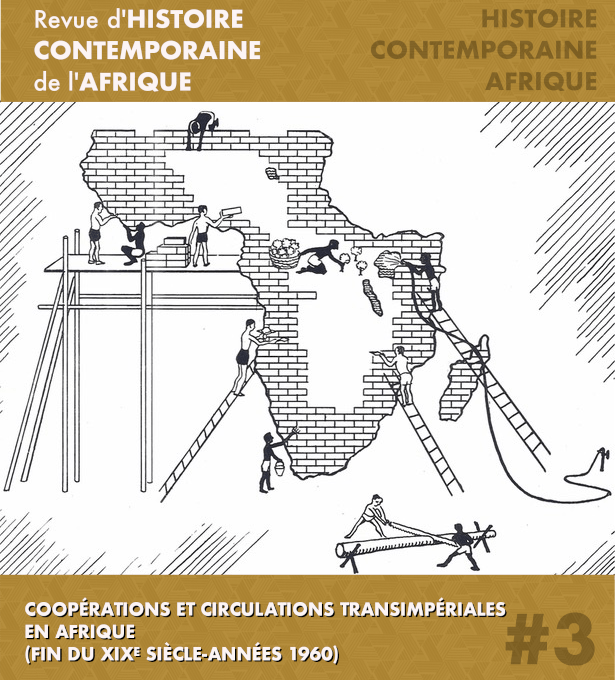
Coopérations et circulations transimpériales en Afrique
A special issue of the Revue d’histoire contemporaine de l’Afrique, n. 3, 2022
All articles are available in open access. Check out my article « Une histoire transimpériale de l’Afrique. Concepts, approches et perspectives« , co-written with Miguel Bandeira Jerónimo
We will present this special issue at the 2022 Swiss Researching Africa Days, Bern, on Saturday 29 October 2023. Many thanks to Claire Nicolas for organizing this event!

WORKSHOP

International workshop
European Histories of Education: Methods, Approaches, and Prospects
University of Geneva, 15-16 September 2022
ESSAY REVIEW: Decolonizing Education
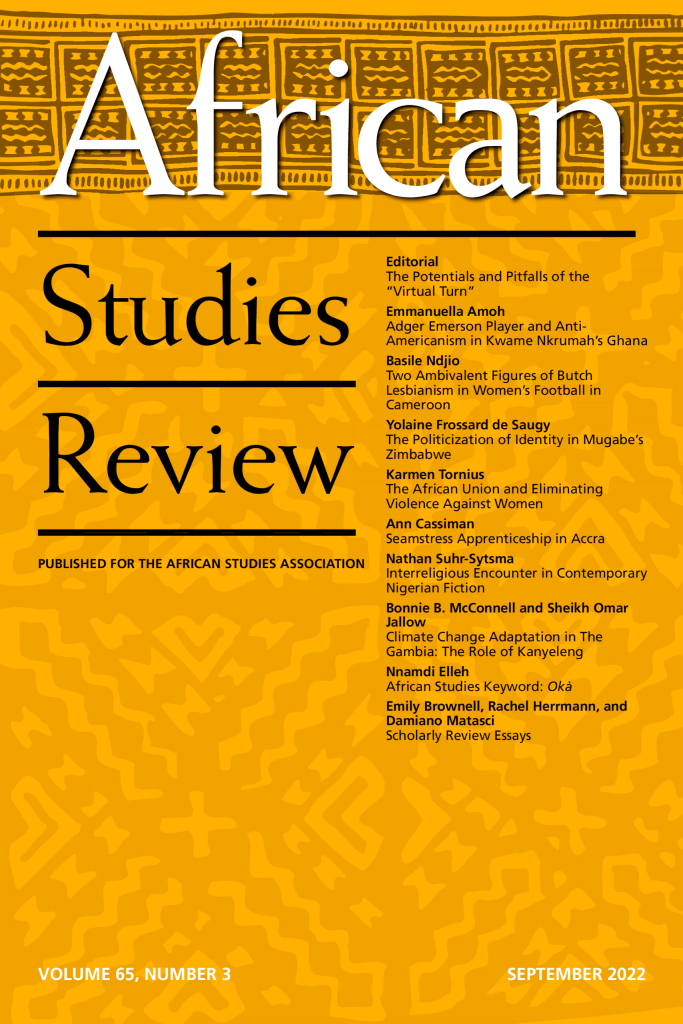
« Decolonizing Education: Historical Perspectives and Contemporary Challenges », Africa Studies Review, vol. 65, no.3, 2022, pp. 761-770.
Check out this scholary essay review I just published in the African Studies Review. I discuss five outstanding books that offer new insights into the « decolonization » of education. Open access here
BOOK CHAPTER: Education and Developement
This chapter provides an overview on the historical interconnections between education and development during the 20th century.
« Education, Development and North-South Relations in the 20th Century », Corinna R. Unger, Iris Borowy, Corinne A. Pernet (eds.),The Routledge Handbook on the History of Development, London, Routledge, 2022.
More information here
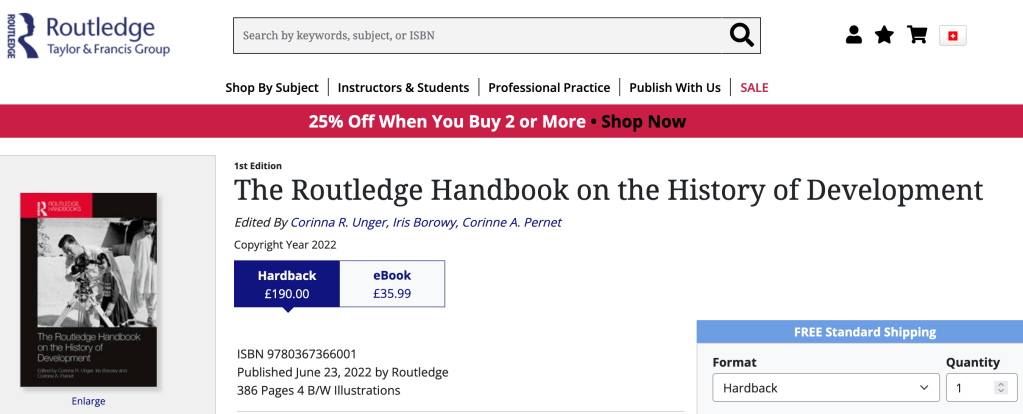
TALK

TALK
Very glad to take part at this exciting seminar in Coimbra. I will present the first results of my « Locusta project ».
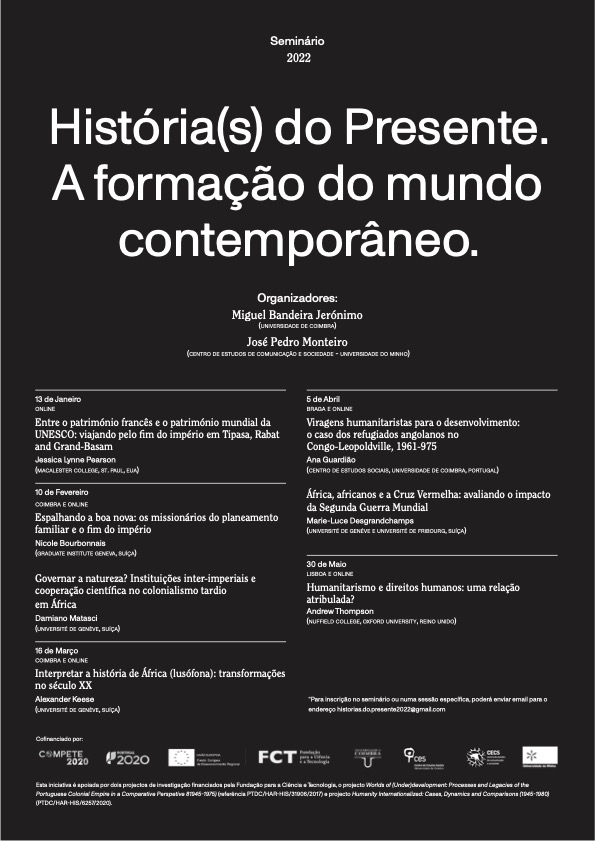
TALK
De la comparaison aux circulations: l’histoire de l’éducation aux prises des jeux d’échelles
Workshop Helitte.ch, HEP Vaud, 8h30-17h45, salle C33-229

ARTICLE: Writing Global History
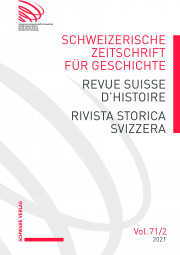
« L’histoire mondiale: un modèle historiographique en question », Revue suisse d’histoire, vol. 71, no 2, 2021, pp. 333-346.
This article provides a comparative analysis on the way the intellectual project of “histoire mondiale” has been tought and implemented in various national contexts. Download
RESEARCH PROJECT
Proud to be part of this new collective project, Humanity internationalized: cases, dynamics and comparisons (1945-1980), coordinated by José Pedro Monteiro and hosted by the Centre for Social Studies of the University of Coimbra (2021-2024).
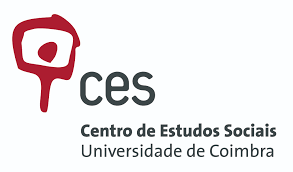
Humanity internationalized: cases, dynamics, and comparisons (1945-1980) (HINT) is an international project that will scrutinize the ways in which humanitarian andH human rights arguments, norms and policies became an institutionalized topic of international affairs, connected to decolonization. This will be done in different chronologies and in relation to distinct colonial and post-colonial geographies and trajectories, considering diverse international institutions (governmental and non-governmental). HINT is based on multiple archives, and is comparative in nature. It will encourage international scientific cooperation, while enhancing the knowledge and competencies of the national scientific system. HINT engages with two of the most important ongoing scholarly debates in international historiography. First, the one about the historical connections between imperial and colonial dynamics, and their markers of coercion, discrimination and inequality, and the internationalization and institutionalization of humanitarian and human rights regimes. Second, the one about the interdependence between the histories of international organizations and of European late colonialism and decolonization. HINT will do so by assessing, in a comparative way, the various dynamics of internationalization of particular events and processes taking place in colonial contexts that shaped the emergence and historical evolution of humanitarian and human rights regimes – distinct but entangled phenomena –, evaluating as well some related post-colonial manifestations. These processes of internationalization were frequently anticolonial in nature, but they also entailed projects of imperial resilience, both sides being duly analyzed by the project. HINT will be empirically and analytically anchored in specific cases that became the object of systematic interest in international organizations.
More information here.
THEMED ISSUE
This themed issue of Paedagogica Historica explores the historical interconnections between internationalism and imperialism in colonial and postcolonial Africa.
Internationalism, Imperialism, and Education in Africa: Connected Histories, Paedagogica Historica. International Journal of the History of Education, vol. 57, no 3, 2021.
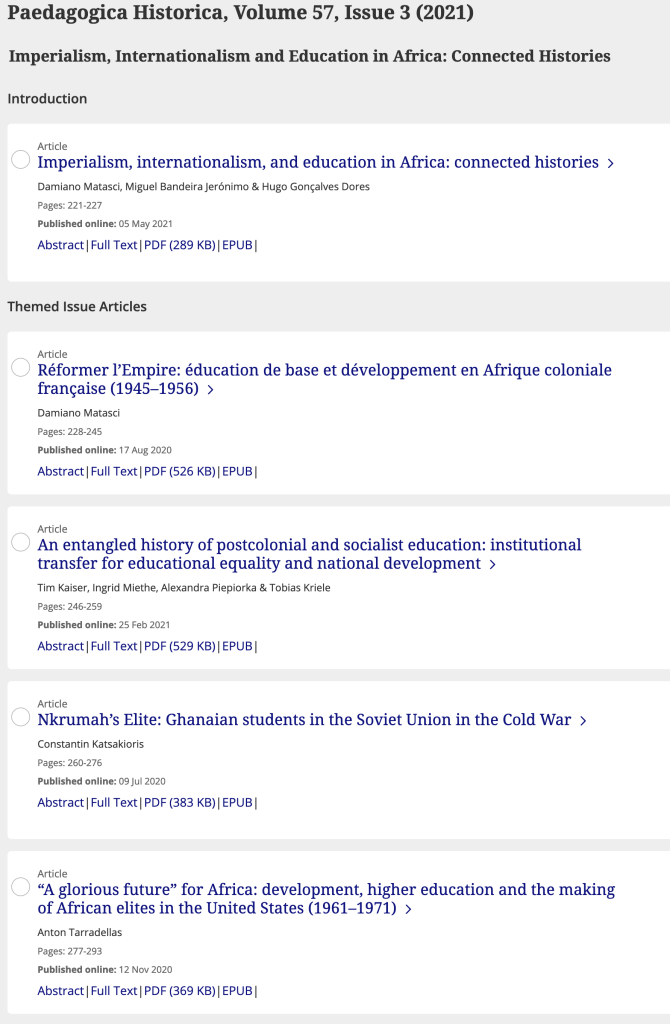
Articles by Damiano Matasci, Constantin Katsakioris, Anton Tarradellas and Tim Kaiser. Available here
2021 LAUSANNE CONFERENCE
The final programme of the international conference Internationalism(s) and Education during the Cold War. Actors, Rivalries and Circulations (Lausanne, June 23-25, 2021) is now available.
The event is open to the public upon previous registration.
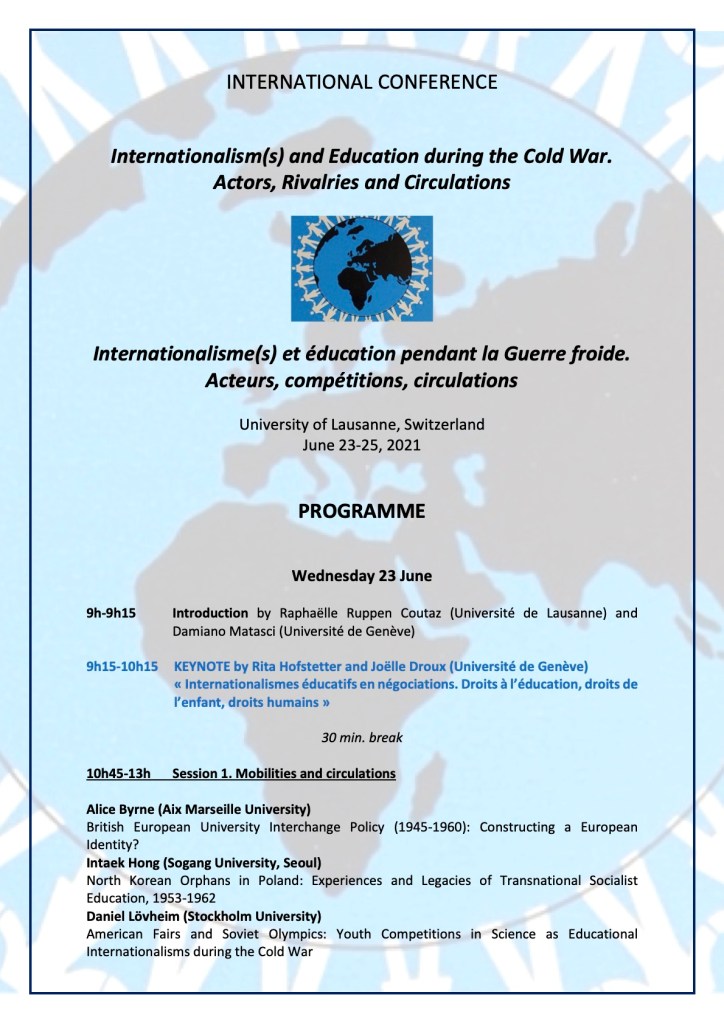
NEW SPECIAL ISSUE
I am the co-editor of this special issue of the Journal of Imperial and Commonwealth History (with Miguel Bandeira Jerónimo):
« Imperialism, Internationalism and Globalisation in Twentieth Century Africa«

Articles by Marta Grzechnik (University of Gdańsk), Geert Castryck (University of Leipzig), Miguel Bandeira Jerónimo (University of Coimbra), Matthew Unangst (Jacksonville University), Lola Wilhelm (University of Geneva), Damiano Matasci (University of Geneva), José Pedro Monteiro (University of Coimbra), Andrea Brazzoduro (University of Oxford)
Have a look at my two articles, available here:
« Imperialism, Internationalism and Globalization in Twentieth Century Africa », The Journal of Imperial and Commonwealth History, vol. 48, no 5, 2020, pp. 793-804 (with Miguel Bandeira Jerónimo).
« Internationalizing Colonial Knowledge. Edgar Barton Worthington and the Scientific Council for Africa, 1949-1956 », The Journal of Imperial and Commonwealth History, vol. 48, no 5, 2020, pp. 892-913.
NEW BOOK
A new edited book is out (October 2020)!
Repenser la “mission civilisatrice”. L’éducation dans le monde colonial et postcolonial au XXe siècle
Co-edited with Miguel Bandeira Jerónimo and Hugo Gonçalves Dores. More information here.

NEW ARTICLE
I have just published a new article in the journal Paedagogica Historica, also avalaible online. It focuses on the intersections between education, development and internationalism in French colonial Africa
Réformer l’Empire: éducation de base et développement en Afrique coloniale française (1945–1956)

NEW SPECIAL ISSUE
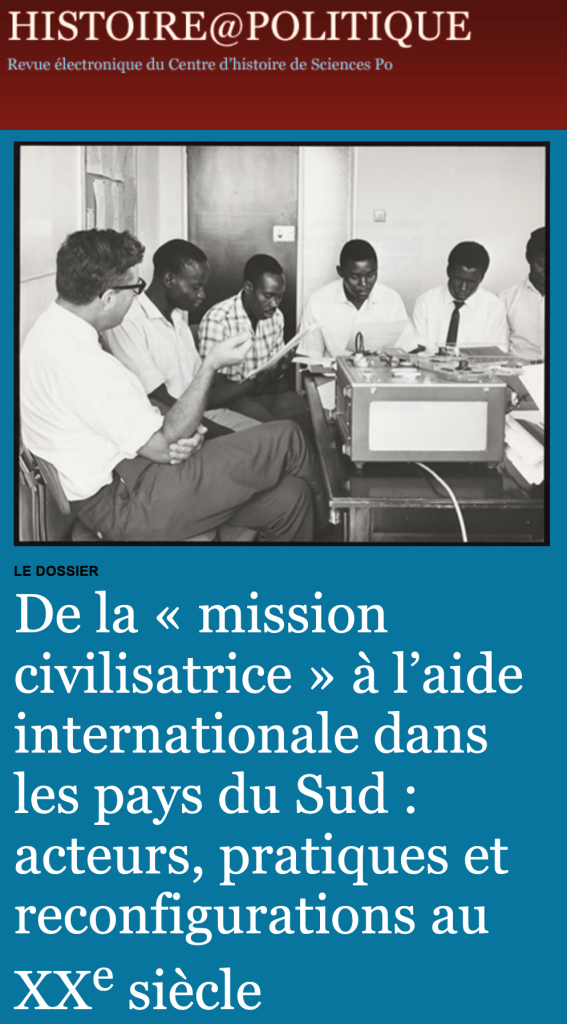
I am the co-editor (with Marie-Luce Desgrandchamps) of this special issue of the French Journal Histoire@Politique (no. 41, 2020):
Contributions by Bertrand Taithe, Miguel Bandeira Jerónimo, Eleanor Davey, Angela Villani, Juliette Dumont, Yi-Tang Lin, José Pedro Monteiro, Lucile Dreidemy, Marie-Luce Desgrandchamps, Damiano Matasci
All articles are open access
NEW BOOK CHAPTER
« Um paradigma para o desenvolvimento: a « educação de base » e os limites da cooperação internacional na África colonial (1945-49) », in Miguel Bandeira Jerónimo, José Pedro Monteiro (eds.), Os Impérios do Internacional: casos, dinâmicas e perspectivas, Coimbra, Edições Almedina, 2020, pp. 275-296.
More information here
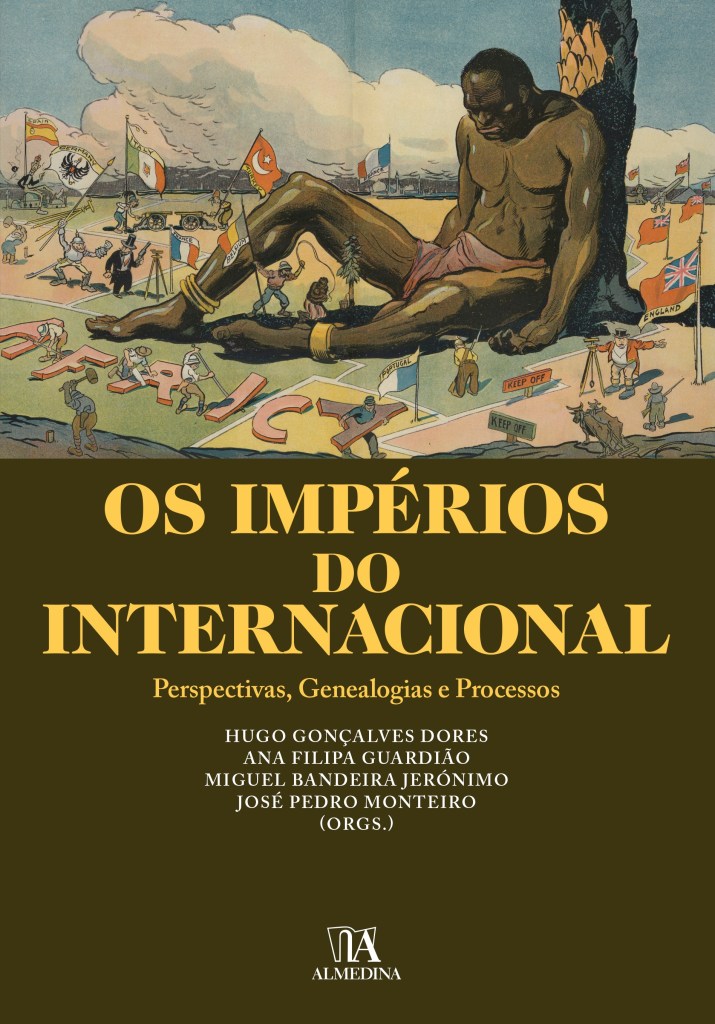
NEW BOOK (Open Access)
Education and Development in Colonial and Postcolonial Africa. Policies, Paradigms, Entanglements
Cham, Palgrave Macmillan, “ISCHE Global Histories of Education series”, 2020.

Co-editor with Miguel Bandeira Jerónimo and Hugo Gonçalves Dores.
Thanks to the support of the Swiss National Science Foundation this book is available in open access.
NEW SPECIAL ISSUE
Humanités et citoyenneté. L’enseignement des lettres et des langues en France, en Belgique et en Suisse au XIXe siècle
Histoire de l’éducation, no 149 (2018, but published in 2019).
Co-editor with Mara Donato di Paola.
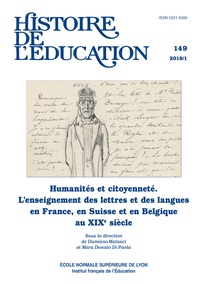
NEW BOOK CHAPTER!
« (De)Constructing the Global Community: Education, Childhood and the Transnational History of International Organizations », in Fuchs, Eckhardt, Vera, Eugenia Roldán (eds.), The Transnational in the History of Education. Concepts and Perspectives, Palgrave MacMillan, 2019.
Book launch at the University of Porto on July 18, 2019.
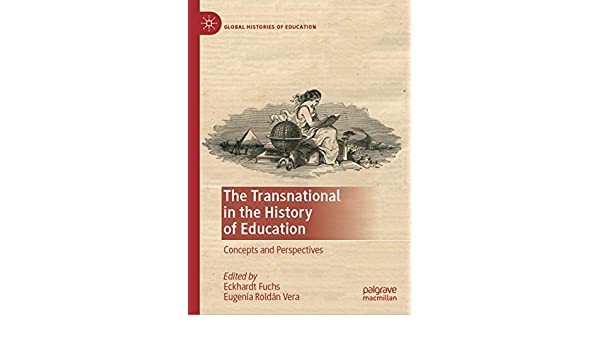
Vous devez être connecté pour poster un commentaire.